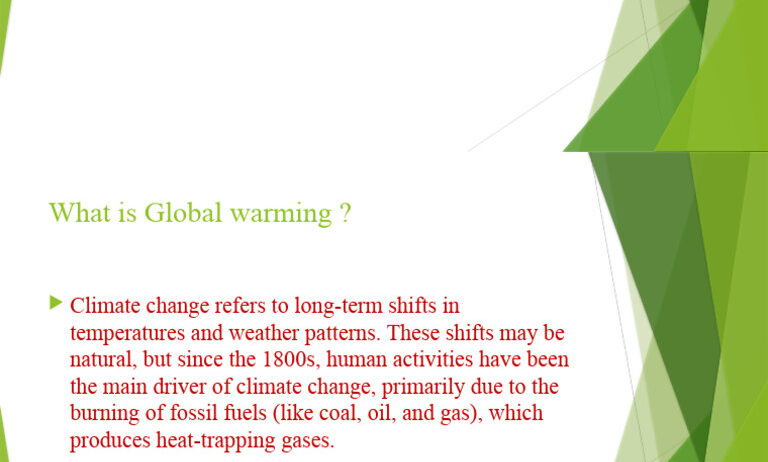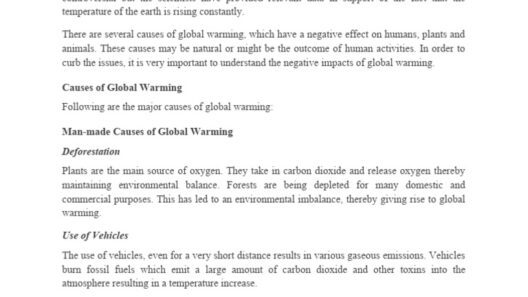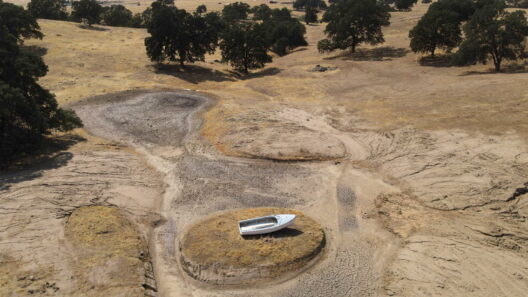Global warming is an increasingly pressing concern that captures the attention of governments, scientists, and citizens around the globe. It refers to the long-term rise in Earth’s average temperature, primarily attributed to the accumulation of greenhouse gases (GHGs) in the atmosphere. Delving into the nuances of global warming enables us to understand its complexities and the imperative for action.
To navigate through this topic, we will dissect what global warming entails, explore its myriad causes, and outline its consequential effects on our planet. An informed populace is crucial for addressing the challenges posed by climate change.
Understanding Global Warming: A Definition
At its core, global warming refers to the phenomenon wherein the Earth’s climate system experiences a gradual increase in temperature due to human-induced and natural processes. The primary driver of this warming trend is the greenhouse effect, a natural process that occurs when certain gases in the Earth’s atmosphere absorb and emit radiation. While this effect is essential for maintaining a habitable planet, the excessive concentration of GHGs exacerbates this natural mechanism, leading to increased atmospheric temperatures.
The baseline global temperature has risen by roughly 1.1°C since the late 19th century, signifying a significant observable shift in the Earth’s climate. The Intergovernmental Panel on Climate Change (IPCC) warns that if current trends continue, we could witness a temperature rise of 1.5°C above pre-industrial levels by 2030, instigating catastrophic impacts on ecosystems and human societies alike.
Unraveling the Causes of Global Warming: From Natural Phenomena to Human Activities
While global warming can be influenced by natural phenomena, such as volcanic eruptions and variations in solar radiation, human activities are the primary culprits. Understanding these causes is fundamental to devising effective mitigation strategies.
Fossil Fuel Consumption: The Dominant Contributor
Combustion of fossil fuels—coal, oil, and natural gas—represents the most significant source of GHG emissions. This practice is ingrained in nearly every aspect of modern life, powering vehicles, generating electricity, and fueling industrial processes. In 2020, fossil fuel combustion accounted for over 70% of total greenhouse gas emissions in the United States alone. The emissions of carbon dioxide (CO₂), methane (CH₄), and nitrous oxide (N₂O) that result from these activities trap heat in the atmosphere, intensifying global warming.
Deforestation: The Carbon Sink Crisis
Forests act as crucial carbon sinks, absorbing vast amounts of CO₂ from the atmosphere. However, extensive deforestation—primarily for agriculture, logging, and urban expansion—negates this effect. The destruction of forests not only releases stored carbon back into the atmosphere but also diminishes the earth’s capacity to absorb future emissions. The Food and Agriculture Organization (FAO) reports that approximately 10 million hectares of forest are lost annually, underscoring the urgent need for sustainable forestry practices.
Industrial Processes: Emission Hotspots
Various industrial practices contribute significantly to GHG emissions beyond fossil fuel combustion. Cement production, chemical manufacturing, and metal smelting are just a few industries that discharge large quantities of CO₂ and other greenhouse gases during their operations. Additionally, the use of hydrofluorocarbons (HFCs) in refrigeration and air conditioning applications, although initially seen as safer alternatives to other ozone-depleting substances, has proven to be a potent climate forcer.
Agriculture: The Role of Methane and Nitrous Oxide
Agricultural activities are significant contributors to global warming, primarily through methane and nitrous oxide emissions. Livestock farming, particularly cattle, generates substantial amounts of methane during digestion. This gas is over 25 times more potent than CO₂ in trapping heat over a 100-year period. Similarly, the use of synthetic fertilizers in crop production releases nitrous oxide—a greenhouse gas that is nearly 300 times more effective than CO₂ at warming the atmosphere over the same timeframe.
Waste Management: Unsustainable Practices
Waste disposal practices, particularly in landfills, are another source of GHG emissions, notably methane. As organic waste decomposes anaerobically, it produces methane gas, contributing to the greenhouse effect. Implementing effective waste management strategies, such as composting and recycling, can significantly mitigate these emissions, highlighting the importance of sustainability in everyday practices.
Consequences of Inaction: The Rising Tide of Global Warming
The repercussions of unchecked global warming are profound and multifaceted, impacting natural environments and human societies alike. Some of the most alarming consequences include:
Melting Ice Caps and Rising Sea Levels
As global temperatures increase, polar ice caps and glaciers melt at an accelerated rate, contributing to rising sea levels. This phenomenon poses an imminent threat to coastal communities, leading to displacement, loss of livelihood, and increased vulnerability to extreme weather events.
Extreme Weather Events: A New Normal
Global warming intensifies the frequency and severity of extreme weather events, from hurricanes and floods to droughts and heatwaves. The chaotic patterns of precipitation and temperature fluctuations have detrimental consequences for agriculture, water supply, and human health, necessitating robust adaptation and resilience strategies.
Impact on Biodiversity: A Fragile Balance
The delicate balance of ecosystems is threatened as species struggle to adapt to the rapidly changing climate. Habitat loss, altered migration patterns, and increased competition for resources contribute to declining biodiversity, leading to the extinction of vulnerable species. Preserving biodiversity is crucial not just for ecological balance but also for human wellbeing, as healthy ecosystems support food security and disease regulation.
In conclusion, understanding global warming and its multifaceted causes is paramount in addressing this global crisis. By recognizing the influences of human activities and advocating for sustainable practices, individuals and communities can play a significant role in mitigating emissions and fostering a healthier planet. It is imperative for us to act decisively and collectively, for the future of generations to come hangs in the balance.








